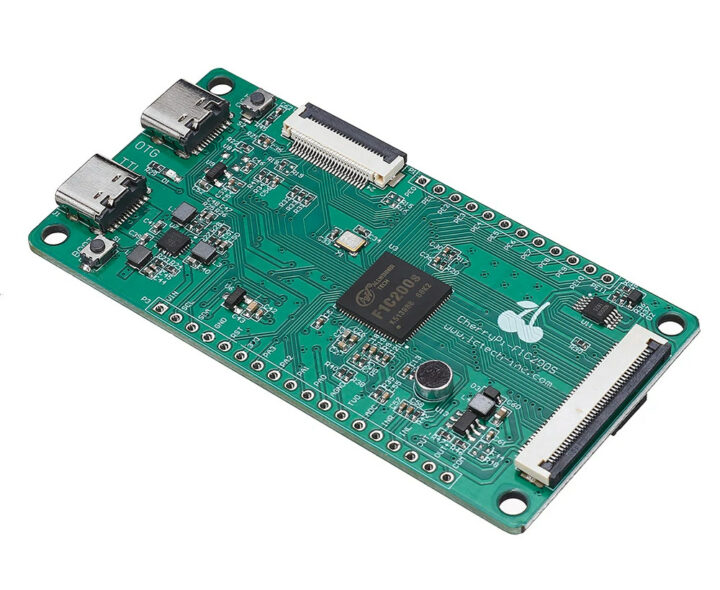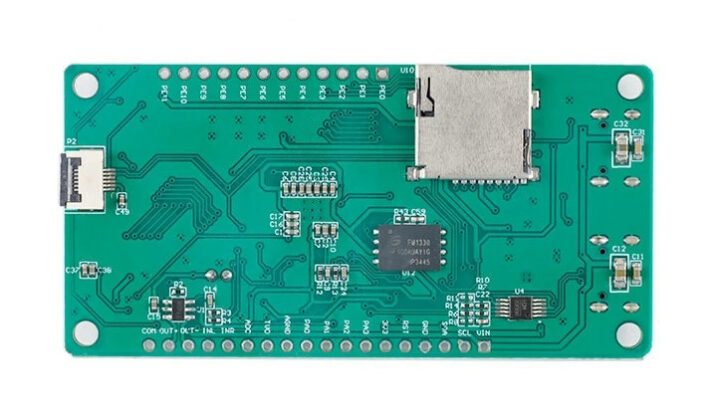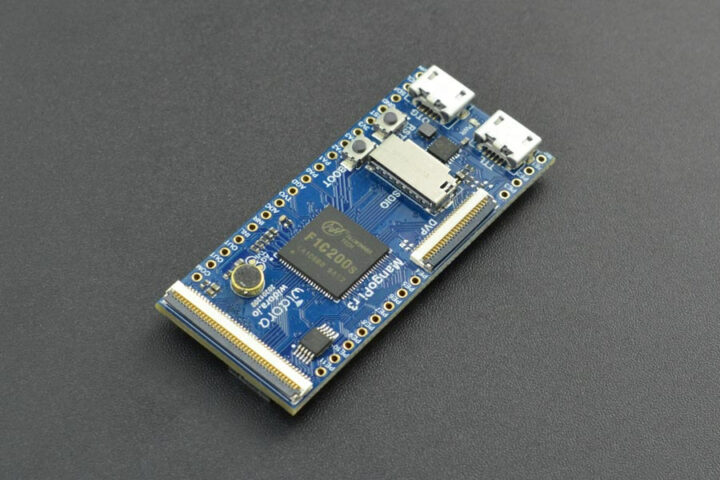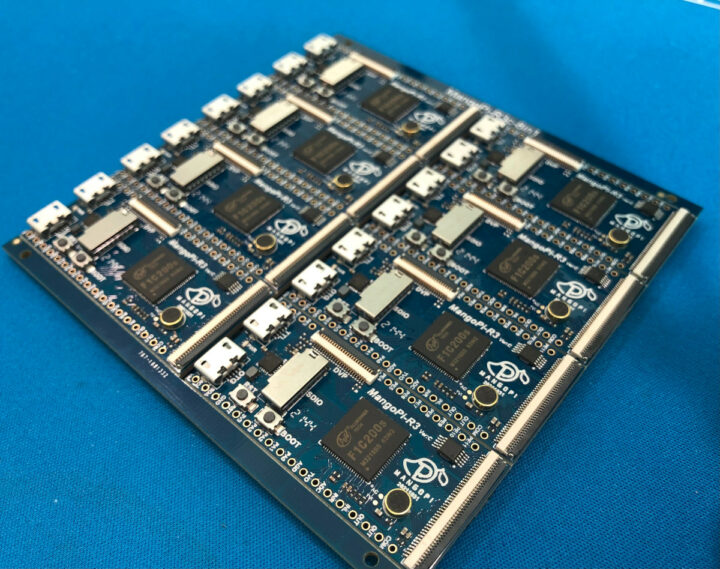I wrote about the Widora TINY200 board based on Allwinner F1C200s ARM9 processor with 64MB built-in RAM, up to 512MB NAND flash, LCD and camera interfaces in April 2020.
I was just informed more similar Allwinner F1C200s boards had recently shown up with Widora MangoPi R3 that’s basically the same as TINY200, and CherryPi-F1C200S with similar dimensions and features, but a different ports arrangement. Let’s have a look at both.
MangoPi R3
MangoPi R3 specifications are the same as the ones for Tiny200 board, but they selected the 128MB NAND flash storage option, and changed the USB-TTL chip:
- SoC – Allwinner F1C200s ARM926EJS processor @ 420 MHz (overclockable to 700 MHz) with 64MB DDR RAM
- Storage – 128MB NAND flash and MicroSD card slot
- Display I/F – 40-pin RGB565 display interface and 6-wire touch interface
- Camera I/F – 24-pin DVP camera interface compatible with OV2640, GC0328, etc.
- Audio – Onboard microphone; Class D audio amplifier
- Connectivity – Optional WiFi via TF-WiFi card (MicroSD WiFi card)
- USB – 1x Micro USB OTG port also supporting FEL flash mode
- Debugging – Micro USB port connected to CH340E USB-TTL serial controller
- Expansion – 30 through holes on the sides for GPIOs, I2C, SPI, SDIO, audio output/input, etc…
- Misc – Boot & Reset buttons
- Power Supply – 5V via Micro USB port
- Dimensions – 50.8 x 22.86mm
Tiny200 had a red PCB, while MangoPi R3 has a blue PCB. The boards above are the latest MangoPi R3 Ver C, and as far as I can tell, the main change is the use of CH340E instead of CP2104. You may wonder if some companies just cloned the design, as the first photo shows Widora, the second MangoPi, and DFRobot hosts the Wiki showing how to get started in Windows or Linux with the Linux+Python image for the board. But as I understand it, MangoPi is a brand from Widora, and DFRobot is clearly a partner… The source code to build a toolchain and the Linux image with buildroot can be found on Github.
MangoPi R3 can be purchased for $15.90 on Aliexpress of DFRobot’s store. They should make it easy to buy accessories like cameras and displays, but the only accessory clearly listed is the OV2640 dual camera module.
CherryPi-F1C200s
 Lctech clearly laid out their own board, the CherryPi-F1C200s are amazingly similar to the ones for MangoPi R3:
Lctech clearly laid out their own board, the CherryPi-F1C200s are amazingly similar to the ones for MangoPi R3:
- SoC – Allwinner F1C200s ARM926EJS processor @ 420 MHz (overclockable to 700 MHz) with 64MB DDR RAM
- Storage – 128MB SPI NAND flash and MicroSD card slot
- Display I/F – 40-pin LCD display interface and capacitive touch interface
- Camera I/F – 24-pin MIPI camera interface compatible with OV2640, OV5640, etc.
- Audio – Onboard microphone; 1W power amplifier chip
- USB – 1x USB Type-C OTG port
- Debugging – USB Type-C port for serial console via CH340E USB-TTL chip
- Expansion – 30x (18 + 12) through holes on the sides for GPIOs, I2C, SPI, SDIO, audio output/input, etc…
- Misc – Boot (for flashing) & Reset buttons
- Power Supply – 5V via either USB-C port
- Dimensions – 76 x 38 mm

There seems to be confusion between DVP and MIPI CSI… The CherryPi-F1C200s board is quite larger, replaces the MicroUSB ports with USB Type-C ports, and the company does not make any claim about WiFi MicroSD card support, but the rest of the features is the same. The lctech-inc.com URL shown on the silkscreen does not load, and I could not find documentation for this board, but it should work with MangoPi R3 software, and one EEVlog user managed to obtain the schematics.
CherryPi-F1C200s is slightly more expensive with the USB-C port and the larger PCB and sells for $17.11 with free shipping on Aliexpress, or $23.53 on Banggood.
F1C200s and its little pin-to-pin compatible brother -F1C100s with 32MB RAM – are getting more popular, and besides the Allwinner F1C200s boards above, we recently covered the $15 “minimum viable computer” with a keyboard, battery, and small display.

Jean-Luc started CNX Software in 2010 as a part-time endeavor, before quitting his job as a software engineering manager, and starting to write daily news, and reviews full time later in 2011.
Support CNX Software! Donate via cryptocurrencies, become a Patron on Patreon, or purchase goods on Amazon or Aliexpress







The F1C100S is popular in game emulation handled consoles
https://fave.co/34tieVx
Seems crazy to use ARM9 when you can get Cortex A7s in the same package for the same sort of money. 🙁
There were F1C100S offerings in the past as low as 8 CNY and presume that is why it gained popularity. However the current price of F1C200S of about 20 CNY does not make it much competitive. One Chinese forum – WhyCan Forum features lots of resources and discussions about F1C100S/F1C200S, as well as other SoCs.
20 CNY isn’t much off the 25 CNY you can get the 2 x Cortex A7 SSD201 or SSD210 for. SSD201 overclocks to 1.7 or 1.8GHz.
the mango and tiny200 are the same according to mango pi in the link below its say formerly “tiny200”.
https://mangopi.org.cn/mangopi_r
Nifty little thingies. USB Type-C ports.
Devs are posting patches for the F1C100S / F1C200S that
share with other Allwinner SoCs => in good shape soon.